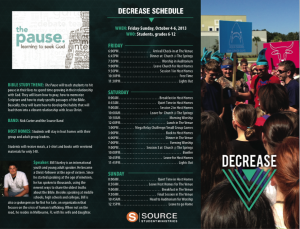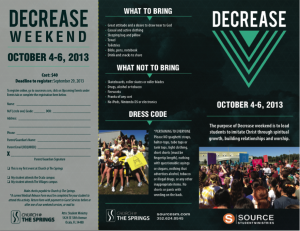by David Hanson | Nov 20, 2013 | The Youth Ministry Blog, Theology
Theology is a misunderstood word in today’s culture. Many times it is used in a derogatory way or because it is misconstrued. To some people, it means a person who is filled with knowledge who loves to debate others. To others it simply means, “the study of God.”
To most, we think of certain “tribes” of people who hold to a certain doctrine. Calvinists, Armenians, premillennialists, amillennialists, and the list goes on and on. Without knowing it, we have put more emphasis into people who wrote about the Bible, than actually studying the Bible.
I’m not a Calvinist or Armenian. I’m a Christ-follower. That is enough for me.
We are all theologians. What? Seriously, Josh? I didn’t go to a specific university or seminary so how am I a theologian? All of us, each day, reveal what we believe. Our actions stem from our beliefs, and where and how those beliefs originate develop a theology.
Simply, theology is the study of God. The implications of studying who God is will have an impact on our lives. Theology dictates what and who we believe in and how we live our life. Eternity hangs in the balance, depending on our theology.
I went to Bible college during my undergrad and went online for my master’s with Liberty University. During my time in Bible college and seminary I noticed that no other word created more fiery debates than “theology.” But what I noticed was that most so-called theologians only wanted to debate secondary issues. The debates I overheard, and admittedly was a part of at times, included a lot of small issues that were blown into large issues.
But each Sunday morning and Wednesday night as I left the dorm room to go serve at a church 45 miles one way, what I noticed was that most of the “theologians” were still in their dorm rooms.
In that moment I realized that your lifestyle reveals your theology.
Anyone can debate, fight and claw to win, but those who actively serve in the mission to seek and save the lost have the right theology.
My friend, if you spend your life trying to find the exact, “perfect” theology but miss the calling to live it out and share Jesus, your theology is dead.
Studying God’s Word is crucial but not just to prepare to win the next argument. Studying God should transform us into the image of God in our humility, passion and love for people. The whole of the Bible could be summed up in two phrases, “Love God, love people.”
Next time you hear the word, “theology,” my encouragement is to stop and think about your lifestyle. Does your theology FIT your lifestyle or does your lifestyle FIT God’s character?
Stop trying to win arguments and start winning people to Jesus by the way you live.
Josh is the student pastor at Church @ The Springs in Ocala, Florida
(www.thesprings.net). Josh has served in student ministry for 9+ years and has a passion to lead students to imitate Christ and influence the world! He has a personal blog at
http://joshrobinson.cc
by David Hanson | Nov 14, 2013 | The Youth Ministry Blog
We want to continually move towards a student ministry OF students, not just TO them. As we create a movement rather than a program, we need to think beyond the school years. Let’s be honest. A lot of time in student ministry is spreading the seed and tilling the ground. We are spending a considerable amount of time planting seed and hoping to see one or two sprout in front of us. Our ultimate goal should be to help equip students to become leaders.
From the beginning of following Christ until the day we die, we are on a mission for God’s glory. Our ministries should be incubators of faith in our students lives that helps them see that we are raising the bar of expectation. We are not going to succumb to the low expectations of the culture around us and instead have reckless faith. But how do we do this practically in our ministries? What does it look like for students to step out and be the light of Christ to the darkness surrounding them. What does it look for a freshmen in college to be prepared to enter their campus on a mission instead of trying to find one.
As we spend time building relationships, teaching for transformation and more, we have to keep the big picture in mind. We are another voice into the lives of the students. Their families have the most influence on their lives. We have to remember that we are simply God’s messenger. The pressure is not on you to be all things at all times to all students. We need each other. We need to equip others. We need to rely on God’s strength. We need to avoid tying our worth into the outward numbers and size of our buildings.
See beyond the outward exterior of your life as a leader.
Are you influencing other people with the gospel?
Is there any space in your life where you and I are leading our spouses to love Jesus?
First we must set the example. If we want our students to be influencers, we need to be leading them to influence. It is a picture of naturally living your life and using all of your gifts, platforms and goals to influence other people with the love of Jesus Christ.
Second, remember that influence comes from imitation:
What you and I focus upon is what leads us. If we are imitating Jesus in our daily lives it will spill over into how we lead others.
Remember today what Jesus said, “I am the vine; you are the branches. If you remain in me and I in you, you will bear much fruit; apart from me you can do nothing.” John 15:5
Josh is the student pastor at Church @ The Springs in Ocala, Florida
(www.thesprings.net). Josh has served in student ministry for 9+ years and has a passion to lead students to imitate Christ and influence the world! He has a personal blog at
http://joshrobinson.cc
by David Hanson | Oct 29, 2013 | The Youth Ministry Blog

One of my favorite kind of events that leads students to grow spiritually are retreats. It creates an opportunity to get away and focus upon investing in their lives.
But how do we plan effective, life-changing retreats?
The first question we must ask is, “Why are you doing it?”
Purpose of retreat: Leading students to imitate Christ through spiritual growth, building relationships and worship.
Steps to planning
– Retreat parent letter with info (mail out 3-4 weeks before the event)
- Create a promo video that highlights the event (Answer these questions: Why should I go? What is it? What will I miss if I don’t go?)
– Scholarship Form 2013 (allows us to help students who can’t come up with the money for the retreat)
– T-shirt design
– Small Group team names for the retreat
– Online sign-ups
– Brochure sign-ups with medical release form included
– Decrease Schedule
– Mega Relay Challenge (big relay race on Saturday of the retreat)
– Name tags (the front is for students to write their names in with sharpies and the back is pre-made with the schedule)
– Food (breakdown each meal to a cost per student)
Leaders
– Small group books
– Host Homes
– Transportation list
Strategy
- We planned a “pump up” night the week prior to the retreat to prepare small groups and help them grow in unity before the retreat even started.
– We enjoyed a recap night the following week so students could share testimonies in their small groups of life-change.
Examples of what I use to plan a retreat:



What would you add to the list of tips on planning a retreat?
Josh is the student pastor at Church @ The Springs in Ocala, Florida
(www.thesprings.net). Josh has served in student ministry for 9+ years and has a passion to lead students to imitate Christ and influence the world! He has a personal blog at
http://joshrobinson.cc
by David Hanson | Oct 17, 2013 | The Youth Ministry Blog
Do you remember growing up as a child and feeling insecure? I remember a moment in time when I was 13 years old and played basketball for my local town in the community league. At the end of each year, they would pick an “all-star” team to play other communities. For me, this was a big deal. I had made the team the year before and did well. This particular year, we had a new coach and a new system. I tried out and misunderstood what the coach had said to everyone. I didn’t receive a phone call but thought it meant I made the team. The opposite was true, though. I walked up to the gym with the guys and waited for the coach to arrive. When he came, I remember him looking at me with a curious but frustrated look. He asked me to step aside as everyone else walked into the gym, and he told me that I had not made the team.
As my friends walked in and I did not, I felt insecure in my ability as a basketball player. This moment in my life fueled my passion to play high school and then college basketball.
My performance was wrapped up in my identity.
I entered the ministry, and the urge to continue to find security in my performance still exists. This in turn reveals my insecurity.
One of my struggles has always been feeling insecure. I have a type A personality with a relentless desire to improve and lead others. My weakness is relying more upon what I do and less upon God’s strength in me.
You might feel this way too. We worry about our reputation, rejection and failure. I’m in a daily learning process of finding confidence in God and not in my performance.
5 Ways to Find Confidence in God:
1. Realize you are a child of God. There is nothing that we can do to make God love us MORE or love us LESS. Let that sink into your heart. He is our Heavenly Father, and He defines us.
2. Serve God out of gratefulness. We shouldn’t be lazy but instead should be diligent to fulfill His calling. We need to relentlessly rely upon the Holy Spirit. I try to maintain this throughout the day by praying about everything. I work FROM gratitude and not FOR His worth.
3. Focus upon God’s blessings. Instead of worrying about what we cannot control, focus upon His blessings. Write a list of ways that God has answered prayer. Talk about the people who have began a relationship with Jesus.
4. Stop comparing and start encouraging. You are not that person and they are not you. God made YOU unique and for a specific purpose of glorifying Him. Focus upon God’s calling for your life and live that out with passion. Comparison kills peace. Comparison kills joy. Contentment builds both peace and joy. The next time you start comparing your salary, home, church size and vehicle, start thanking God for His blessings.
5. Trust God with the results. We are not responsible to change people. We are simply given the opportunity to imitate Jesus and influence others with Jesus. God is God; we are not.
What is it in your life that makes you feel insecure? What would you add to the conversation?
Josh is the student pastor at Church @ The Springs in Ocala, Florida
(www.thesprings.net). Josh has served in student ministry for 9+ years and has a passion to lead students to imitate Christ and influence the world! He has a personal blog at
http://joshrobinson.cc
by David Hanson | Oct 10, 2013 | The Youth Ministry Blog
Have you ever felt sleepy driving on the interstate? It’s the moment when your tires start to “humm” as they roll over the small ridges on the side of the road that becomes a warning sign and wakes you up! It is only when you realize you are headed off the road that you can make a correction to stay on track.
In ministry and in life, we must set up boundaries.
Emotions are powerful. Emotions are a part of our makeup as human beings. God created us as emotional beings. The first step in breakdowns in boundaries is allowing emotions to be the driving factor to leadership.
Emotions left alone will lie to us most of the time. A lot of people think that sexual temptation is simply physical, but it truly begins emotionally.
5 Emotional Boundaries Every Leader Needs to Build:
1. Avoid talking heart-to-heart with other women besides your spouse.
I will talk and encourage girls but then connect them to a trusted female leader for further counsel. As leaders, our heart should be in pursuit of our spouse with reckless abandonment. Build healthy boundaries that support your families, especially your spouse.
2. Avoid the pressure to make a quick decision based on momentary feeling.
Emotional decisions are usually fast. They are impulsive and without discretion that take a long time to clean up.
I try to ask the questions, “Is this worth spending my emotional energy?” or “Will I regret what I’m about to do, in an hour?”
3. Stop worrying about things we cannot control.
Emotional conversations are usually without thought and usually include gossip and slander. Control is an illusion anyway.
When I feel the urge to complain or become angry, I’m trying to learn to surrender it to God.
4. Ministry does not define me.
We all want to succeed in ministry. But, at the end of the day, our identity is found IN Jesus and not through our ministry job. I’m a follower of Jesus first, then I’m a pastor. This truth helps me process the good or bad days of ministry.
If someone praises you, let it go to God and not your head. We are the instruments of God, and He deserves praise.
5. Always Forgive.
In ministry, we will face hurt. Jesus taught us to forgive and through His strength we can live free of bitterness. Bitterness eats away our passion for people, because we are reliving a moment in time over and over in our mind. A lack of forgiveness in a leader’s heart eventually saps them dry and leads them to look for sinful choices to fill the hurt. Forgive no matter what someone has said or done to you. Remember, we will never have to forgive anyone more than how much Jesus has forgiven us.
When our emotions and thoughts are in line with the Holy Spirit, then you will see clarity and peace.
How important do you think emotional boundaries are in ministry? In your life, where have you set emotional boundaries?
I’d like to hear your thoughts!
Josh is the student pastor at Church @ The Springs in Ocala, Florida
(www.thesprings.net). Josh has served in student ministry for 9+ years and has a passion to lead students to imitate Christ and influence the world! He has a personal blog at
http://joshrobinson.cc





